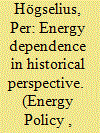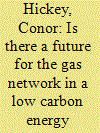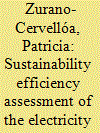|
|
|
Sort Order |
|
|
|
Items / Page
|
|
|
|
|
|
|
| Srl | Item |
| 1 |
ID:
166340


|
|
|
|
|
| Summary/Abstract |
Studies of energy and geopolitics have been almost totally monopolized by analyses of the largest and most powerful countries in the world. This article argues that it is crucial to include the world's smaller and less powerful nations, too, into the analysis. Adopting a systems perspective, the article discusses Europe's smaller nations that have come to depend on other countries for various activities relating to their fuel supplies, and how they have sought to cope with these dependencies over time. It discusses, in particular, two overarching strategies in this context: first, investments in domestic energy sources, and secondly, efforts to cope with – rather than to reduce – energy imports. Smaller nations have often been more dependent and more vulnerable than the larger countries in the geopolitical energy arena. However, there are numerous exceptions to this pattern, especially in terms of the critical hub positions that a range of smaller nations have managed to secure in the international energy trade. Furthermore, Europe's smaller countries have had a more narrow range of methods at their disposal than the larger countries when it comes to coping with energy dependence – but perhaps not as narrow as commonly believed.
|
|
|
|
|
|
|
|
|
|
|
|
|
|
|
|
| 2 |
ID:
125397


|
|
|
|
|
| Publication |
2013.
|
| Summary/Abstract |
The March 2011 nuclear accident at the Fukushima Daiichi nuclear power station affected both short- and long-term energy-security in Japan, resulting in crisis-driven, ad hoc energy policy and, because of the decision to shutter all nuclear reactors, increased the country's demand for fossil fuels, primarily natural gas. However, the effects of the accident on energy security were not restricted to Japan; for example, the worldwide availability and affordability of liquefied natural gas were affected by Japan's increased demand; while the accident itself resulted in the loss of public acceptability of nuclear power and led countries, such as Germany and Italy, to immediately shut down some of the nuclear reactors or abandon plans to build new ones.
This paper examines some of the short-term effects on global energy security following the accident at Fukushima, focusing on the main replacement fuel, liquefied natural gas. It shows, amongst other things, that the accident increased investment in liquefied natural gas projects around the world. The paper shows that despite Fukushima contributing to nuclear power's loss of acceptability in most developed countries, it is still seen as an essential way of improving energy security in many countries and, despite what its critics may say, will probably continue to be used as a significant source of low-carbon electricity.
|
|
|
|
|
|
|
|
|
|
|
|
|
|
|
|
| 3 |
ID:
166566


|
|
|
|
|
| Summary/Abstract |
Interdisciplinary energy research is essential. It advances our understanding of potential transitions from high to low carbon energy systems. However, it is easier to propose than deliver. It requires translation into a simpler language, to aid communication, but not at the expense of the conceptual language that drives our understanding of complex energy systems. We combine legal, political science, and policy studies to show how to balance the need to communicate accessibly and recognise legal and policymaking complexity. We begin with a statement so accepted in legal studies that it has become a truism: the law in the books is not the same as the law in action. The allocation of legal competences is only one influence on policymaking in a complex system. We describe three key ways to conceptualise this relationship between law, policy, and energy systems, focusing on the: (1) ‘on paper’ legal separation of powers between different governments, (2) interaction between law and policy in practice, including blurry boundaries between formal responsibility and informal influence, and (3) role of law as one of many contributors to policymaking. We use these approaches to explain the implications of Brexit for UK energy policy.
|
|
|
|
|
|
|
|
|
|
|
|
|
|
|
|
| 4 |
ID:
177390


|
|
|
|
|
| Summary/Abstract |
Hydropower accounts for approximately 60% of electricity generation in Canada, with growth expected in the coming decades as part of renewable energy transitions; however, frequent cost overruns threaten the viability of this growth. Using the integrated assessment model GCAM, we develop an endogenous representation of hydropower for Canada that accounts for market dynamics, thus permitting analysis of hydropower competition with other electricity generation technologies, both with and without cost overruns. Results show that modelling hydropower resources endogenously increases Canadian hydropower deployment relative to an assumption of fixed hydropower production, from 417 to 495 TWh annually by 2050. In scenarios that apply cost overruns at historical levels, hydropower loses market share to more easily scalable technologies like wind power. When including high cost overrun assumptions, the model determines that hydropower falls from about 73% to 65% of Canadian electricity generation by 2050, while wind power increases from about 8% to 11%. Countries may be better able to achieve electrification and renewable energy targets at lower cost by avoiding large-scale, overrun-prone hydropower and nuclear generation projects. Model results support that cost overruns are important considerations for policy decisions related to electricity sector development in Canada and elsewhere.
|
|
|
|
|
|
|
|
|
|
|
|
|
|
|
|
| 5 |
ID:
107511


|
|
|
|
|
| Publication |
2011.
|
| Summary/Abstract |
In this study, an interval-valued minimax regret analysis (IMRA) method is proposed for planning greenhouse gas (GHG) abatement under uncertainty. The IMRA method is a hybrid of interval-parameter programming (IPP) and minimax regret analysis (MMR) techniques. The developed method is applied to support long-term planning of GHG mitigation in an energy system under uncertainty. Mixed integer linear programming (MILP) technique with fixed-charge cost function is introduced into the IMRA framework to facilitate dynamic analysis for decisions of timing, sizing and siting in planning capacity expansions for power-generation facilities. The results obtained indicate that replacing fossil fuels with renewable energy sources (i.e. hydro, wind and solar power) can effectively facilitate reducing the GHG emissions. They can help decision makers identify an optimal strategy that can facilitate reducing the worst regret level incurred under any outcome of the uncertain GHG-abatement target.
|
|
|
|
|
|
|
|
|
|
|
|
|
|
|
|
| 6 |
ID:
163561


|
|
|
|
|
| Summary/Abstract |
This paper evaluates the potential low carbon opportunities for and challenges to the utilisation and financial performance of Ireland's gas distribution network within a series of low carbon scenarios. There has been a limited amount of academic literature published on the future implications of gas demand on gas networks. This paper takes the unique perspective of assessing the stranded asset risk to a utility operating a gas network in the context of a low carbon energy system. Building on established emissions reduction scenarios, a financial model is developed from an integrated energy system model to understand the financial risks associated with continued investment in gas networks. We find that higher network tariffs are required for consumers in the future to cover network costs, even though gas consumption grows relative to current consumption levels in low carbon scenarios with carbon capture and storage.
|
|
|
|
|
|
|
|
|
|
|
|
|
|
|
|
| 7 |
ID:
101432


|
|
|
|
|
| Publication |
2010.
|
| Summary/Abstract |
Tensions are evident in energy policy objectives between centralised top-down interconnected energy systems and localised distributed approaches. Examination of these tensions indicates that a localised approach can address a systemic problem of interconnected systems; namely vulnerability.
The challenge for energy policy is to realise the interrelated goals of energy security, climate and environmental targets and social and economic issues such as fuel poverty, whilst mitigating vulnerability. The effectiveness of conventional approaches is debatable. A transition to a low carbon pathway should focus on resilience, counter to vulnerability.
This article draws from on-going work which evaluates the energy aspects of a Private Finance Initiative (PFI) project to refurbish and re-build a local authority's entire stock of sheltered accommodation to high environmental standards. Initial findings suggest that whereas more conventional procurement processes tend to increase systemic vulnerability, a user focussed process driven through PFI competitive dialogue is beginning to motivate some developers to adopt innovative approaches to energy system development.
|
|
|
|
|
|
|
|
|
|
|
|
|
|
|
|
| 8 |
ID:
192722


|
|
|
|
|
| Summary/Abstract |
Bioenergy with carbon capture and storage (BECCS) can be a useful and cost-effective climate change mitigation tool but it is reliant on economic incentives. With this policy perspective article we question the ongoing discussion about the use of biomass for BECCS with basis in three points: (1) under the enhanced transparency framework under the Paris agreement, all parties to the agreement will use the same guidelines to estimate emissions by sources and removals by sinks, in which the emissions and removals in connection to cultivation of biomass are accounted for in the land-use, land-use change and forestry (LULUCF) sector, (2) adding carbon capture to existing processes may lead to a shift in products from that process rather than an increase in biomass use, and (3) BECCS requires substantial financial incentives. With basis in these points, we argue that a certification framework for BECCS that contradicts the guidelines of the Intergovernmental Panel on Climate Change (IPCC) risks unnecessarily hindering deployment of a potentially cost-effective climate change mitigation tool.
|
|
|
|
|
|
|
|
|
|
|
|
|
|
|
|
| 9 |
ID:
162297


|
|
|
|
|
| Summary/Abstract |
Energy systems are undergoing a significant shift to renewable energy (RE). To date, the surface area required for RE systems is greater than that for non-RE systems, exacerbating existing environmental policy challenges, from increasing land competition, to visual impacts. A suitable metric for comparing the extent of systems is the power density of electricity production, that is, the electrical power produced per horizontal m2 of surface area. This study systematically reviews power densities for 9 energy-types (wind, solar etc.) and multiple sub-types (e.g., for solar power: PV, solar thermal) in the United States. Median, mean, and uncertainty estimates are provided for 177 different densities from the literature. Non-renewable power densities are found to be three orders of magnitude larger than renewable densities. Natural gas and solar energy yield the highest median density per non-RE, and RE system respectively. Solar energy was the only system to experience a significant, positive relationship in power density over time. We apply these density estimates to NREL scenarios of future energy systems for state-specific assessments, and find that the largest growth in land use is in the southern United States.
|
|
|
|
|
|
|
|
|
|
|
|
|
|
|
|
| 10 |
ID:
090031


|
|
|
|
|
| Publication |
2009.
|
| Summary/Abstract |
A strategic analysis methodology is presented for adaptive energy systems engineering to realize an optimal level of service in the context of a community's social,economic, and environmental position.
|
|
|
|
|
|
|
|
|
|
|
|
|
|
|
|
| 11 |
ID:
169738


|
|
|
|
|
| Summary/Abstract |
Assessing the sustainability level of the power sector can aid the transition towards a sustainable energy system. In this contribution, we propose a novel approach to compare and optimize electricity mixes according to sustainability criteria and apply it to the 28 EU members. Our method combines life cycle assessment, data envelopment analysis (DEA) and rigorous mathematical programming tools in three main steps. Firstly, DEA is applied to assess the efficiency level of electricity mixes of EU member countries considering the three dimensions of sustainability. Then, electricity portfolios of inefficient countries are optimized by solving a model that seeks to attain the targets provided by DEA while simultaneously considering the technical aspects governing electricity generation. This model, which constitutes the cornerstone of our approach, complements standard DEA by ensuring realistic and meaningful targets. In the third step, we evaluate the electricity portfolios optimized previously by running DEA again. Our results suggest that energy policies in the EU should favor the deployment of hydropower, wind and solar, while simultaneously displacing non-renewable sources and bioenergy. The deployment of carbon capture and storage is also a potential alternative that could be incentivized via policies worded in terms of carbon intensity targets.
|
|
|
|
|
|
|
|
|
|
|
|
|
|
|
|
|
|
|
|
|